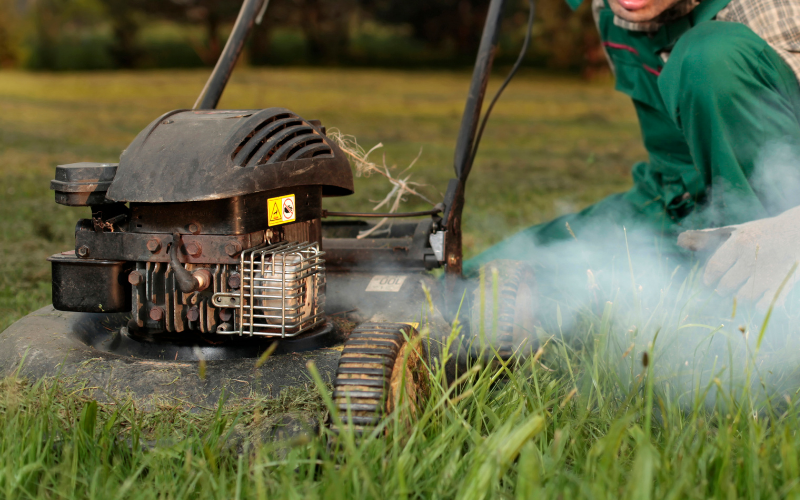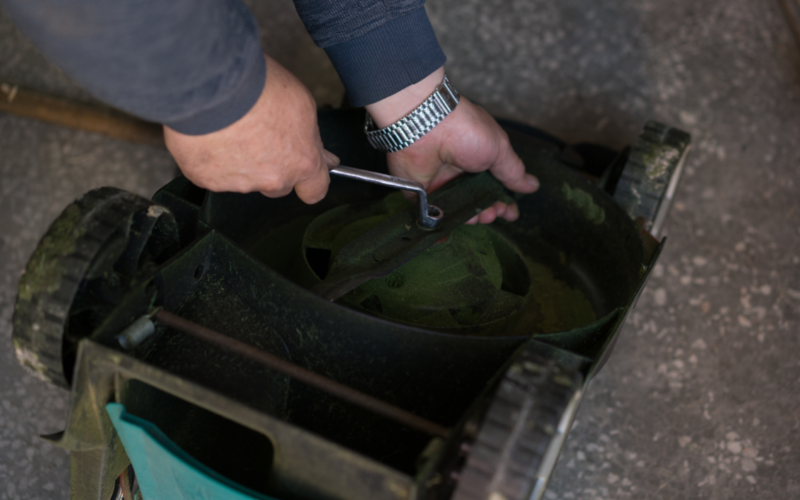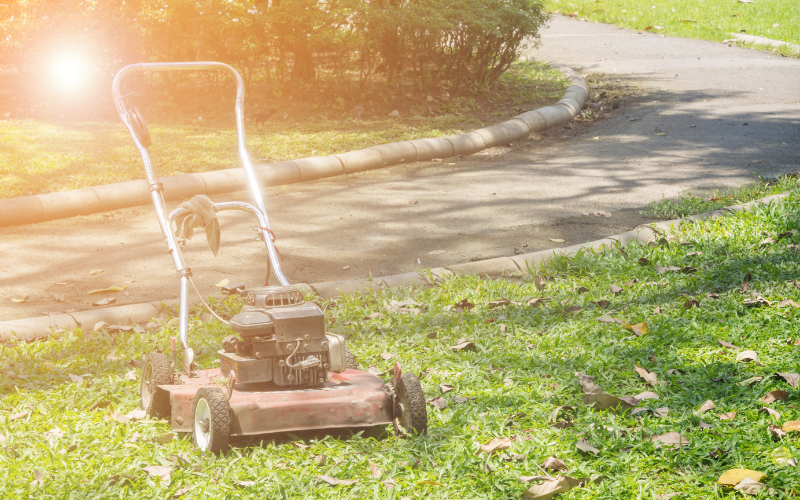If you have a gas or electric lawn mower, to say the motor or engine is an important part of your mower would be an understatement. It’s the moneymaker, the beating heart, the MVP. But it needs the right conditions to be able to do its job. If it gets too hot, it’s bad news. A lawn mower overheating will result in it shutting off. And that means the blade stops spinning and the grass strops getting cut. Bummer! But why do lawn mowers overheat, what do you do when this happens, and is there anything you can do to prevent a lawn mower overheating?

Why is My Lawn Mower Overheating?
As you can probably imagine, there are quite a few potential reasons for a lawn mower overheating, which will vary depending on whether you have an electric mower or a gas mower. But causes for any lawn mower overheating include blocked air vents, a loose, blunt or damaged blade, clogged cutting deck, and having the cutting height set too low. Issues specific to gas mowers that could lead to overheating include insufficient engine oil and a clogged air filter.
The Main Reasons Why Lawn Mowers Overheat
In this section, I’m going to run through a few of the more common reasons why your lawn mower may be overheating. This can act as a bit of a checklist that you can run quickly run through to figure out what’s causing the problem. Most probably you’ll just need to then perform a quick bit of maintenance to get your mower purring again.
It goes without saying, but I’ll say it anyway. If your mower has overheated, you’ll need to leave it for 20-30 minutes to cool down before you do any work on it. How hot does a lawn mower engine get do you think? The answer is VERY HOT – over 250 degrees Fahrenheit – and you can easily burn yourself if you’re not careful!
Now back to the reasons for lawn mowers overheating…
Setting the Cutting Height Too Low
Think of the cutting height rather like a conveyor belt on a factory production line. If they crank the speed of that belt right up, you have to work harder and harder to keep up. You’ll end up a sweaty mess – hot and bothered. It’s quite the same when you set your cutting height too low. You’re asking your mower’s engine/motor to work far harder than it’d like to, and that generates more heat.
If you have a particularly powerful engine/motor, it may be able to use this additional capacity to do the job without overheating and cutting out (no pun intended). But the cutting height being set too low is a common cause of overheating lawn mowers that have less powerful engines/motors.
Solution: This one is really quite simple. You move the cutting height up a notch or two from where you usually have it set. You’ll notice a difference right away and this will help keep your engine cooler, preventing overheating. As a general rule, you should never try and cut more than a 3rd of the length of the grass in one session anyway, as it’s bad for the health of your grass.
Blade is Loose or Bent
Both of these scenarios are a problem that can cause lawn mower overheating, as like the last tip, they make the engine/motor work that much harder to try and deliver the cleanly cut grass that you expect.
If a lawn mower blade is loose, it won’t be capable of cutting the grass properly. The tips of the blade will have a bit of “wiggle room” that they shouldn’t have, and this will cause the cutting height to change constantly. A telltale sign of a loose blade is when you notice your lawn mower cutting unevenly. The same is true of a bent lawn mower blade (check this guide on bent lawn mower symptoms if you’re not sure if this applies to you). A bent blade won’t have that wiggle room (unless it’s also loose), but when bent out of shape it’ll cut uneven.
But back to the point of this article. Both bent and loose mower blades can lead to overheating. This is because cutting efficiency is worse, so there’s more strain on the motor/engine, and it could get too hot to function properly.
Solution: If you suspect that there could be something wrong with your blade, the first thing to do is to confirm whether this is the case or not. So tip your lawn mower on its side, and have a look. If it’s bent, you’ll need to install a new blade. If it’s just a bit loose, you can simply tighten it up.

Blunt Mower Blade
This is really very similar to the problems caused by a loose or bent blade. A blade that is no longer sharp enough will really overwork the engine/motor and cause it to overheat. If you’ve ever prepared dinner with a blunt set of knives, you’ll be able to relate. It takes forever to chop things up. Well, it’s the same for your mower. Cutting the grass becomes a much more arduous task. Without the sharp edge, the blade will essentially rip your grass, and that’s hard work (and not good for the health of your grass either).
Solution: If you recently sharpened the blade, this probably isn’t the issue. But if you can’t remember the last time it was sharpened or replaced, it’s probably worth checking. So flip your mower over and see if the blade is blunt. Check this if you’re not sure how sharp a mower blade should be.
Blocked Air Vents
Both gas mowers and electric mowers have air vents incorporated into their design to try and prevent them from overheating. This flow of cool air that is channeled to the engine/motor while it is in operation helps to maintain the temperature at an acceptable level. However, these vents can get blocked, so no/limited cool air flows through to the engine, and this is one of the most common causes of a lawn mower overheating.
When cutting the grass, it’s pretty standard for the debris to be blowing about, and as the mower rolls along the floor, it’s actually very easy for debris to build-up on different parts of the mower, including the air vents.
Solution: Clean the vents! Take a stiff-bristled brush and give the air vents a thorough going over. If they were completely clogged up with dry debris, this could have been the sole cause of your lawn mower overheating. Make sure you regularly check on the condition of these vents going forward.
Clogged Cutting Deck
If you turn over your mower and find a load of dried-on clippings and other debris that looks as though it’s been there since the Jurassic period, this could be causing your lawn mower overheating problem.
You see, the airflow that is generated by the blade is very important to the proper functioning of your mower. Most people think it’s all about the blade. But that airflow is very important, helping the grass to stand up tall for an even cut, and also for discharging the clippings quickly from the deck. When the deck is clogged up, this airflow is far less efficient, the mower battles to discharge the clippings, and the engine/motor works harder and harder. You guessed it – this can lead to it overheating.
Solution: You’ll need to turn your mower over for this (obviously) and have something like a putty knife at the ready. You’re simply going to scrape off all that debris, bit by bit, until it’s all gone. To avoid such an intensive job in the future, I recommend giving the undercarriage of the mower a rinse and wipe-down after every mow, particularly if your grass is a little damp when you mow.
Read this article if you want to know how to keep grass from sticking under the mower deck.
Causes of Lawn Mower Overheating Specific to Gas Mowers
The stuff we’ve already discussed could cause any type of motorized mower to overheat. But gas mowers have a few of their own specific causes of overheating that are worth mentioning.
Oil Level is Low
Maintaining the oil level is vital to the health of your mower’s engine. The oil acts as the lubricant that keeps all internal engine parts operating smoothly. When it runs low, there is more friction when these parts are operating, which generates additional heat. Sometimes enough for your lawn mower to overheat and shut down.
Solution: Check the oil level in your mower right away. Is it below the minimum recommended level? If so, you need to add some more right away. Then remember to keep an eye on the oil level throughout the season, as forgetting to add oil can have far more serious consequences than your lawn mower overheating. The engine can seize up.
Dirty/Clogged Air Filter
All gas mowers have some sort of air filter that prevents dirt and dust from getting into the engine. Obviously, these get dirty over time (that’s their whole purpose) and need to be changed. If they don’t get changed, it stops the air that is needed for the combustion process from getting through. An engine that is not receiving enough air really, really struggles. It might cut out, or it may soldier on and end up overheating as a result.
Solution: None of this is rocket science to be honest. If you have a gas mower overheating, check the condition of the air filter. Install a new one if necessary (if it’s a paper filter and dirty) or clean it (in the case of a foam filter). Get into the habit of periodically checking your air filter to avoid problems like your lawn mower overheating.

POA for a Lawn Mower that Overheats
In summary, if you suspect your lawn mower is cutting out due to overheating, there are few simple checks you can do once you’ve left it to cool down for a while.
- Is your cutting height set too low?
- Is your mower blade loose, bent or blunt?
- Are the air vents blocked?
- Is the underside of the deck clogged?
- Is the oil level below the minimum amount? (gas mower)
- Is the air filter overly dirty? (gas mower)
If you check all of these things and are still having issues with your lawn mower overheating, it could be that you have a more serious issue like a cracked engine block or that your mower simply isn’t powerful enough to do the job you’re asking it to do. E.g. if you’ve got a budget electric model and are expecting it to cut or mulch tall, thick grass. Your only option in that scenario is going to be to buy a replacement that has a more powerful motor/engine.


You forgot using old fuel. Think of all the old fuel attracting air and water, then burning that, making your engine hot.
Thanks for the feedback! That hadn’t occurred to me, but I could see how bad gas might put extra strain on the motor and lead to overheating.
This was a huge help. My mower was overheating too quickly, but the thought of raising the cutting level did not occur to me even though I did see quite a bit of grass clogging things up. I raised the blades, and everything worked like a charm! Thanks!
I’m really glad that it helped, John 🙂 Thanks for your comment!
Tom.